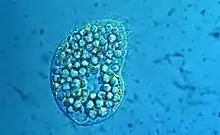Colpodea
The Colpodea are a class of ciliates, of about 200 species common in freshwater and soil habitats. The body cilia are typically uniform, and are supported by dikinetids of characteristic structure, with cilia on both kinetosomes. The mouth may be apical or ventral, with more or less prominent associated polykinetids. Many are asymmetrical, the cells twisting sideways and then untwisting again prior to division, which often takes place within cysts. Colpoda, a kidney-shaped ciliate common in organic rich conditions, is representative.
| Colpodea | |
|---|---|
 | |
| Colpoda inflata | |
| Scientific classification | |
| (unranked): | Diaphoretickes |
| Clade: | TSAR |
| Clade: | SAR |
| Infrakingdom: | Alveolata |
| Phylum: | Ciliophora |
| Subphylum: | Intramacronucleata |
| Class: | Colpodea Small & Lynn 1981 |
| Typical orders | |
| |
Most ciliates placed here were originally considered advanced trichostomes, on the assumption that they lacked true oral cilia. However the Bursariomorphida, large carnivorous ciliates whose oral cavity forms a deep anterior pocket, were considered heterotrichs because of their prominent oral polykinetids. The modern class was first defined by Small & Lynn in 1981, based mainly on the structure of the body kinetids.
References
Further reading
- Rekik, Amira; Drira, Zaher; Guermazi, Wassim (2012). "Impacts of an uncontrolled phosphogypsum dumpsite on summer distribution of phytoplankton, copepods and ciliates in relation to abiotic variables along the near-shore of the southwestern Mediterranean coast" (PDF). Marine Pollution Bulletin. 64 (2): 336–346. doi:10.1016/j.marpolbul.2011.11.005. PMID 22154276.
- Bourland, William A.; Wendell, Laura; Hampikian, Greg; Vd'acnˇ y, Peter (Feb 2014). "Morphology and phylogeny of Bryophryoides ocellatus n. g., n. sp. (Ciliophora, Colpodea) from in situ soil percolates of Idaho, U.S.A.". European Journal of Protistology. 50 (1): 47–67. doi:10.1016/j.ejop.2013.09.001. PMID 24168852.
External links